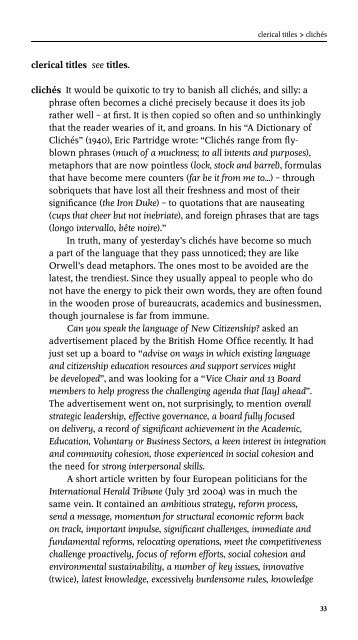Economist Style Guide - Redress Information & Analysis
Economist Style Guide - Redress Information & Analysis
Economist Style Guide - Redress Information & Analysis
Create successful ePaper yourself
Turn your PDF publications into a flip-book with our unique Google optimized e-Paper software.
clerical titles see titles.<br />
clerical titles > clichés<br />
clichés It would be quixotic to try to banish all clichés, and silly: a<br />
phrase often becomes a cliché precisely because it does its job<br />
rather well – at fi rst. It is then copied so often and so unthinkingly<br />
that the reader wearies of it, and groans. In his “A Dictionary of<br />
Clichés” (1940), Eric Partridge wrote: “Clichés range from fl yblown<br />
phrases (much of a muchness; to all intents and purposes),<br />
metaphors that are now pointless (lock, stock and barrel), formulas<br />
that have become mere counters (far be it from me to…) – through<br />
sobriquets that have lost all their freshness and most of their<br />
signifi cance (the Iron Duke) – to quotations that are nauseating<br />
(cups that cheer but not inebriate), and foreign phrases that are tags<br />
(longo intervallo, bête noire).”<br />
In truth, many of yesterday’s clichés have become so much<br />
a part of the language that they pass unnoticed; they are like<br />
Orwell’s dead metaphors. The ones most to be avoided are the<br />
latest, the trendiest. Since they usually appeal to people who do<br />
not have the energy to pick their own words, they are often found<br />
in the wooden prose of bureaucrats, academics and businessmen,<br />
though journalese is far from immune.<br />
Can you speak the language of New Citizenship? asked an<br />
advertisement placed by the British Home Offi ce recently. It had<br />
just set up a board to “advise on ways in which existing language<br />
and citizenship education resources and support services might<br />
be developed”, and was looking for a “Vice Chair and 13 Board<br />
members to help progress the challenging agenda that [lay] ahead”.<br />
The advertisement went on, not surprisingly, to mention overall<br />
strategic leadership, effective governance, a board fully focused<br />
on delivery, a record of signifi cant achievement in the Academic,<br />
Education, Voluntary or Business Sectors, a keen interest in integration<br />
and community cohesion, those experienced in social cohesion and<br />
the need for strong interpersonal skills.<br />
A short article written by four European politicians for the<br />
International Herald Tribune (July 3rd 2004) was in much the<br />
same vein. It contained an ambitious strategy, reform process,<br />
send a message, momentum for structural economic reform back<br />
on track, important impulse, signifi cant challenges, immediate and<br />
fundamental reforms, relocating operations, meet the competitiveness<br />
challenge proactively, focus of reform efforts, social cohesion and<br />
environmental sustainability, a number of key issues, innovative<br />
(twice), latest knowledge, excessively burdensome rules, knowledge<br />
33


